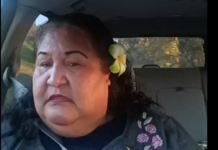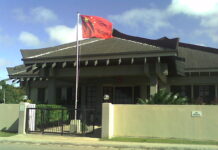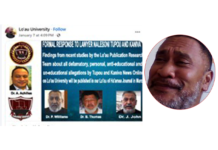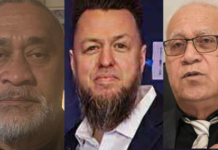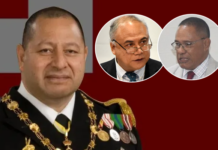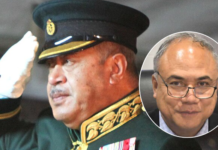Brussells, 1978.
It was 2am when he heard the deep voice calling his name.
The 13 year-old sat up in bed. He thought it was his father calling, so he made his way down the passage to his parent’s bedroom, only to hear his father snoring, sound asleep.
The voice called his name three times that night and, scared, he went out on to the balcony of their apartment and prayed.
For Fr Johnathan Hurrell, who recently stepped down from two terms as head of the US province of the Congregation of the Sacred Hearts of Jesus and Mary, that night in 1978 was the first time he thought he had a vocation.
“It really jolted me,” he said.
And then, he said, he kissed a girl and everything changed, but somehow that sense of something or somebody calling him kept coming back.
After several years in the Belgian capital, where his father represented Tonga at the Lome Convention trade talks, the family returned to the southern hemisphere.
He spent 15 years in Tonga, rising early to go to mass. He found peace in the quiet church and often accompanied his grandmother, a woman of deep faith.
Eventually he returned to Auckland, where he was born, to study for a Bachelor of Communications degree at Auckland University.
After two years he left and worked in a variety of jobs, including Sorrento’s and Telecom before going to teach in Tonga where he reconnected with his grass roots.
He lived the life of a fairly normal young single man.
“I wasn’t a saint by any means,” he said.
“But I grateful for those experiences.
“It makes it more real, especially when I’m counselling.”
Shocked
When he finally decided to investigate whether he truly had a vocation, he went to Fiji to talk to the Marists, but they told him he should be a Jesuit and sent him away.
Then he went to Hawai’i on the advice of a family member and spoke to the Congregation of the Sacred Hearts of Jesus and Mary, who welcomed him.
“My friends were a bit shocked and my siblings thought I’d gone mad,” Fr Hurrell said.
“I summoned up the courage to tell my father, who reminded me that I’d told him in Belgium I was going to be a priest and he had told me to come back in 10 years and tell him again if I was serious.”
Years of study followed, culminating in a Masters in Divinity in Washington, followed by two years as a deacon in Hawai’i.
He took his perpetual vows in 2002 and was ordained in 2005, becoming Fr Jonathan Hurrell, SSCC. After five years he was voted in as head of his order’s US province, which includes Hawai’i.
Fiji
Having stepped down from two terms as provincial, he is now heading for Fiji, where he will be Director of the SSCC House of Formation where our students attend the Pacific Regional Seminary in Suva.
The move to Fiji has been on the cards since 2014 as a practical response to the enormous cost of training priests. Fr Hurrell said Fiji offered a sense of simplicity, a strong sense of prayer, mission and community life.
“We will be trying to form young men to work in the Pacific and worldwide,” Fr Hurrell said.
There will be 13 seminarians from five different nationalities
Part of the task would also be to identify those who had true vocations and those for whom it was just an opportunity to do something else, he said.
Challenges
The seminary’s young priests will face a range of challenges and would need to continue their development and education throughout their working lives.
“It doesn’t stop once they become a priest,” he said.
The clergy needed to be much more driven.
“There are too many priests in the Pacific sitting around drinking kava” he said.
The growing prominence of Islam and the Mormon church would require priests to be kept informed and to understand what was happening and why.
“We must recognise the divine inspiration that is incorporated in all religions,” Fr Hurrell said.
“But being informed is absolutely crucial.”
He said even when overall numbers of a religious group were not large, they could have a big impact on small communities, especially when people might be tempted by material benefits rather than spiritual ones.
“Conversions are often shallow,” he said.
Priests would also have to navigate carefully among issues of politics, social and cultural pressures, treading a line between engaging with others honestly, acknowledging differences and showing a healthy respect through dialogue.
“Being ordained doesn’t make you super smart,” Fr Hurrell said.
“It gives you the responsibility to learn how to carry out your ministry better.”

